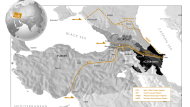Equator Principles: Principles, Profits or just PR?
Amsterdam, BankTrack, Johan Frijns, +31-6-12421667, +31-20-6868111
San Fransisco, Friends of the Earth US, Michelle Chan-Fishel +1 202 427 3000
London, Friends of the Earth, Simon McRae, +44-20-75661670

Amsterdam, BankTrack, Johan Frijns, +31-6-12421667, +31-20-6868111
San Fransisco, Friends of the Earth US, Michelle Chan-Fishel +1 202 427 3000
London, Friends of the Earth, Simon McRae, +44-20-75661670
One year after the launch of the Equator Principles (EP), a bank-led initiative to establish common environmental and social standards for project finance, NGOs have released an assessment on the implementation and effectiveness of the Principles so far.
A new BankTrack report, titled “Principles, Profits, or Just PR? Triple P investments under the Equator Principles”, examines whether the Principles have promoted a ‘Triple P’ approach to investments, balancing People, Profit and Planet in a way that is truly sustainable, or whether they are perhaps a mere PR effort.
The report examines the current situation on project, institutional and group level. Based on the limited information publicly available, it finds that generally implementation of the EPs has been poor to middling. It also concludes that despite the existence of the Principles, many controversial projects went ahead virtually unaltered.
“Since the launch of the Equator Principles in June 2003, NGOs have grown increasingly impatient with the unwillingness of the banks to share information and engage with stakeholders. Due to this secrecy, it is impossible for the public or even the endorsing banks themselves to properly assess whether the Principles are being implemented or making a difference.” said Johan Frijns, coordinator of BankTrack, an international network of advocacy NGOs monitoring the Equator banks. “Every now and then the EP website heralds the signing of yet another bank onto the Principles, but we are not seeing results on the ground, nor evidence that the EP are being fully implemented by all the endorsers”
The report analyzes several key transactions financed by Equator banks in the past year, such as the Baku-Tbilisi-Ceyhan oil pipeline.
“Both BankTrack and the Equator banks point to the Baku-Tbilisi-Ceyhan pipeline as a key test case for Equator Principles implementation,” said Greg Muttit of UK-based PLATFORM, who analyzed how the pipeline violated the Principles on over 30 counts. “The banks claimed that the pipeline complied with the principles, but refused to say how and why. As a result, few saw the banks’ claim as credible, Now, the pipeline’s continuing ethical, legal and human rights problems clearly show the extent of the banks’ failure to apply the Principles”
The report mentions several additional controversial deals financed by Equator banks, such as the Kárahnjúkar hydro project in Iceland, and flags upcoming projects as the Sahkalin II oil and gas project in the Russian Far East, the Omkareshwar dam in India and the Nam Theun II dam in Laos as a severe test case for the good faith application of the Principles.
The report further describes the attempt of eleven Equator banks to block proposals designed to improve the ability of World Bank extractives investments to serve the poor.
“One of the most distressing things we have seen this year is how Equator banks have formed themselves into a lobby group to block pro-poor reforms at the World Bank,” said Simon McRae of Friends of the Earth UK. “Certainly Equator banks have a right to express their own opinion, but when they band together to become obstructionists it deals a blow to their integrity”.
The report provides anecdotes of strategies that individual Equator banks have employed to implement the Principles at their own institutions, and finds that there is wide variation in how banks have “mainstreamed” the Principles into their management systems.
It concludes with several recommendations to restore a sense of good faith in the principles, notably the adoption of an Independent Accountability, seek active stakeholder engagement in the implementation of the EPs, be transparent on investment decisions based on the EPs and provide leadership for the continuous improvement and implementation of the Principles.
“This report, and the recommendations it contains, signals that NGOs still have some hope for the Principles, and that we want to see them work,” said Michelle Chan-Fishel of BankTrack/Friends of the Earth US. “However, if the Equator banks continue to finance controversial deals, pursue an anti-environmental lobbying agenda and cloak themselves in secrecy and unaccountability, public confidence will be irretrievably lost.”

